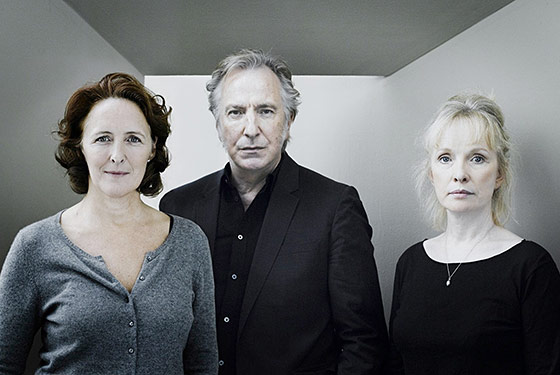
“Henrik Ibsen,” wrote the New York Times in 1897, “is not a ‘nice’ person.” This was in response to his latest (and second to last) work, a windy tragedy of ambition and modern solipsism titled John Gabriel Borkman. The title character is a disgraced banker living under a sort of self-imposed house arrest after serving time for an embezzlement scheme that reached Madoff-ian levels of infamy and sullied the family name forever.
In the revival currently at BAM, Borkman is played with sour defiance by Alan Rickman. His bilious wife Gunhilde (Fiona Shaw) loathes him passionately and keeps him confined to the upstairs chambers, where he paces constantly, audibly, “like a sick wolf.” Her twin sister Ella (Lindsay Duncan) keeps them both afloat, out of longstanding loyalty to the man she once loved. Borkman felt the same way, but threw her over when a man in a position to advance his career made it known that he wanted Ella. Borkman shrugged and married her twin instead. “I am a man — remember that,” Borkman explains to his ex-inamorata. “I loved you as a woman — you meant more than life to me. But when, if it has to be, one woman is replaceable by another.” (If there’s a Norwegian equivalent of “Aw, snap!” please Google-translate and embed it here.)
This is not “nice” stuff, springing as it does from the grim chasms Ibsen opened up in his later work, where he moved beyond prescriptive social critique into more bleak explorations of modern moral vacuity. It’s so lavishly not-nice, in fact, that it plays today somewhere in the neighborhood of black comedy. (But don’t tell me Old Henrik didn’t know what he was doing: A senior citizen getting run over by the jingle-belled sleigh his daughter is riding in? That was just as funny at the turn of the century as it is today.) James Macdonald’s production for the Abbey (working from Frank McGuinness’s new version) looks plenty tundralike and blasted (the set is nothing but snowdrifts, shabby furniture, and a menacing wood stove with an infinite chimney pipe that goes up and up and up, into nothingness), but quite a lot of energy’s been (well) spent on refining the comic timing. No one does blustery, operatic fury quite like Shaw (“I will build a monument on top of your grave!”), and watching Rickman dig into Borkman’s demonic/heroic existential narcissism is worth the price of admission. “No one but you would have done it,” says Gunhilde, speaking to her husband about his crime. “No one but you.” “Perhaps not,” he shoots back, “but that’s because they could not do what I could do. And had they done it, that would not have been with my exact aims in mind. Things would have been quite different. So you see, I find myself innocent of all charges.”
Rickman’s gelid self-possession clicks best against Shaw’s piping-hot hate; in scenes with the chilly Duncan (whom Macdonald seems to have designated the straight man), the dialogue goes a little damp and drab, and the energy ebbs. There are moments when he looks ready to bow out completely, and the play’s near-Wagnerian conclusion, with its screaming snowy gales and swirling symbols of capitalist despoilment, remains a staging challenge. It’s occasionally difficult to parse Borkman’s overreaching as a master of the universe from Rickman’s over-extension as an actor: He works best at low, pensive, menacing volume, and his final fist-to-the-sky manifesto feels off-key. But the play practically guarantees this awkwardness for any actor; it’s trying to swallow itself up, to become the self-negation it seeks to describe in modern ambition. For better or worse, it succeeds.




